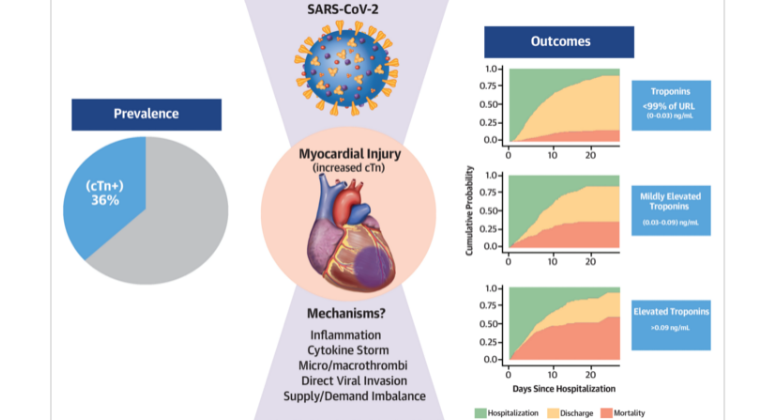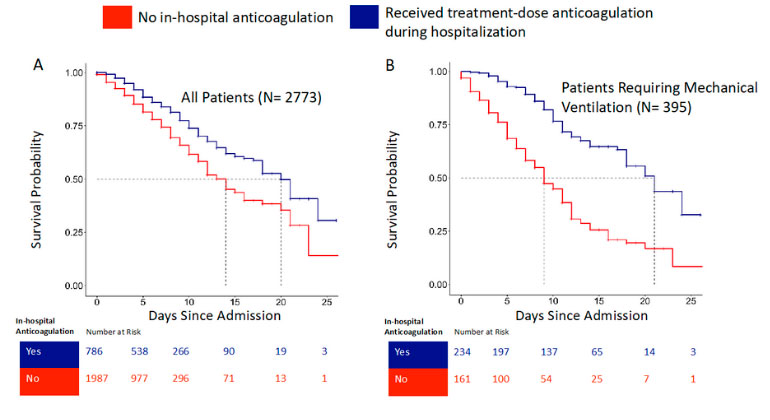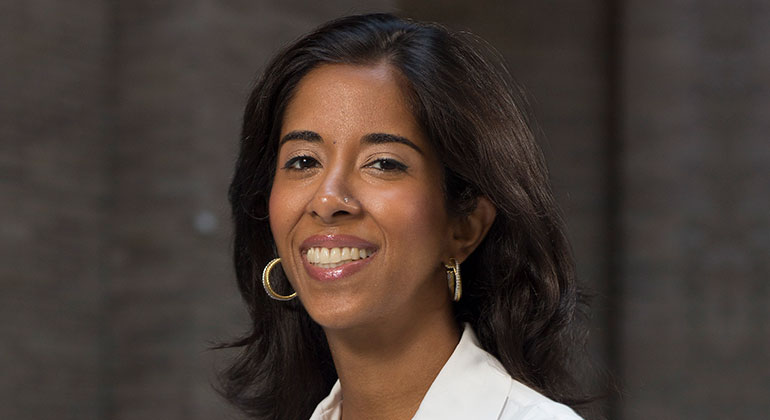Patients Hospitalized With COVID-19 Have a Small Risk of Heart Failure
Doctors are encouraged to watch for symptoms in acute hospitalization
Patients hospitalized with COVID-19 may be at risk of developing heart failure even if they do not have a previous history of heart disease or cardiovascular risk factors, a new Mount Sinai study shows.
Researchers say that while these instances are rare, doctors should be aware of this potential complication. The study, published in the April 26 online issue of the Journal of the American College of Cardiology, may prompt more monitoring of heart failure symptoms among patients hospitalized with COVID-19.
“This is one of the largest studies to date to specifically capture instances of new heart failure diagnosis among patients hospitalized with COVID-19. While rare, the finding of new heart failure was more common among patients with preexisting cardiovascular risk factors or disease. But there were select individuals who developed new heart failure without risk factors or disease. We need to learn more about how SARS-CoV-2 [the virus that causes COVID-19] may directly affect the cardiovascular system and precipitate new heart failure- as to whether it is an indirect effect of critical illness or direct viral invasion,” says lead researcher Anu Lala, MD, Director of Heart Failure Research at the Icahn School of Medicine at Mount Sinai. “Importantly, though symptoms of heart failure—namely shortness of breath—can mimic symptoms associated with COVID-19, being alerted to the findings of this study may prompt clinicians to monitor for signs of congestion more consistent with heart failure than COVID-19 alone.”
The team of researchers looked at electronic medical records of 6,439 admitted and confirmed COVID-19-positive adult patients between February 27 and June 26, 2020, at Mount Sinai Health System hospitals. The median age was 64. Investigators found 37 patients (0.6 percent) with no prior history of heart failure who developed new cases of heart failure during their hospitalization for COVID-19. Of those new heart failure patients, eight of them (22 percent) had no previous cardiovascular disease or risk factors, while 14 had a history of heart disease and 15 had no heart disease but at least one risk factor for it. The eight patients with no prior history were younger with an average age of 43, mostly male, and had lower body mass index and fewer comorbidities such as respiratory or renal diseases. These eight patients also had more instances of cardiogenic shock, a life-threatening condition where the heart suddenly can’t pump enough blood to the body. The patients who did have a history or risk factors for heart disease were, on average, 73 years old. All new heart failure patients were in the hospital for a similar amount of time, seven days on average, and survival rates were similar among both groups.
“Understanding specific mechanisms as to how COVID-19 may precipitate new heart failure should be the focus of future work,” says first author Jesús Álvarez García, MD, PhD, a postdoctoral fellow in advanced heart failure and transplantation at Icahn Mount Sinai.
“Moving forward, we also need to monitor patients after hospitalization for COVID-19 for signs and symptoms of heart failure, based on studies demonstrating fibrosis in the myocardium on MRI following infection. We still need to understand underlying mechanisms of injury related to infection with SARS-CoV-2. It has become obvious that the pandemic and its aftermath will be with us for some time, so devoting energy to better understanding its impact on the cardiovascular system, particularly as it relates to the precipitation of heart failure, is crucial,” says Dr. Lala. “It will also be important to monitor if patients develop heart failure later down the line, and more broadly how the cardiovascular system is impacted after recovery from COVID-19.”
This study is an extension of previous Mount Sinai research that found patients with a history of heart failure and hospitalized with COVID-19 were more likely to experience a longer hospitalization, nearly three times the risk of intubation and mechanical ventilation, and double the risk of death, compared to those without a history of heart failure.
About the Mount Sinai Health System
Mount Sinai Health System is one of the largest academic medical systems in the New York metro area, with more than 43,000 employees working across eight hospitals, over 400 outpatient practices, nearly 300 labs, a school of nursing, and a leading school of medicine and graduate education. Mount Sinai advances health for all people, everywhere, by taking on the most complex health care challenges of our time — discovering and applying new scientific learning and knowledge; developing safer, more effective treatments; educating the next generation of medical leaders and innovators; and supporting local communities by delivering high-quality care to all who need it.
Through the integration of its hospitals, labs, and schools, Mount Sinai offers comprehensive health care solutions from birth through geriatrics, leveraging innovative approaches such as artificial intelligence and informatics while keeping patients’ medical and emotional needs at the center of all treatment. The Health System includes approximately 7,300 primary and specialty care physicians; 13 joint-venture outpatient surgery centers throughout the five boroughs of New York City, Westchester, Long Island, and Florida; and more than 30 affiliated community health centers. We are consistently ranked by U.S. News & World Report's Best Hospitals, receiving high "Honor Roll" status, and are highly ranked: No. 1 in Geriatrics and top 20 in Cardiology/Heart Surgery, Diabetes/Endocrinology, Gastroenterology/GI Surgery, Neurology/Neurosurgery, Orthopedics, Pulmonology/Lung Surgery, Rehabilitation, and Urology. New York Eye and Ear Infirmary of Mount Sinai is ranked No. 12 in Ophthalmology. U.S. News & World Report’s “Best Children’s Hospitals” ranks Mount Sinai Kravis Children's Hospital among the country’s best in several pediatric specialties.
For more information, visit https://www.mountsinai.org or find Mount Sinai on Facebook, Twitter and YouTube.

Heart Injury Among Hospitalized COVID-19 Patients Associated with Higher Risk of Death
Jun 08, 2020 View All Press Releases
Blood Thinners may Improve Survival among Hospitalized COVID-19 Patients
May 06, 2020 View All Press Releases
